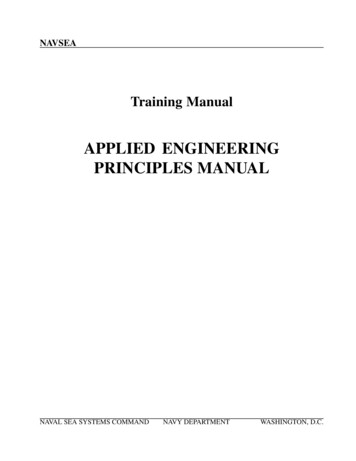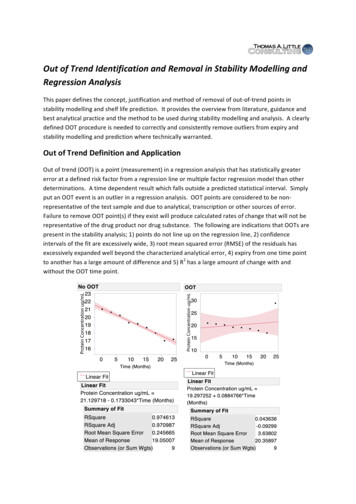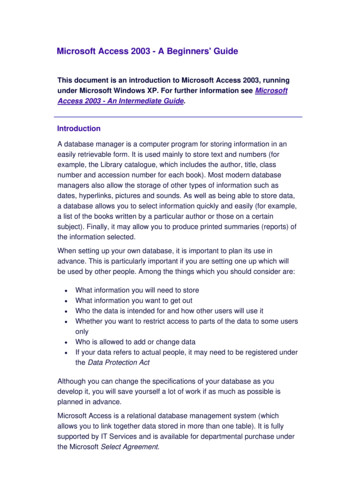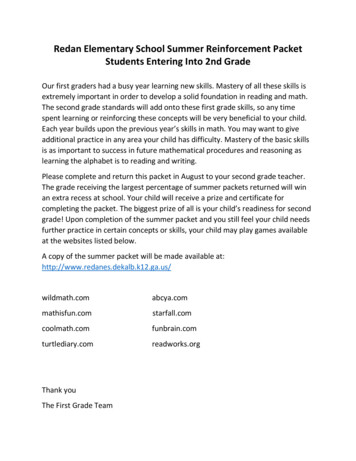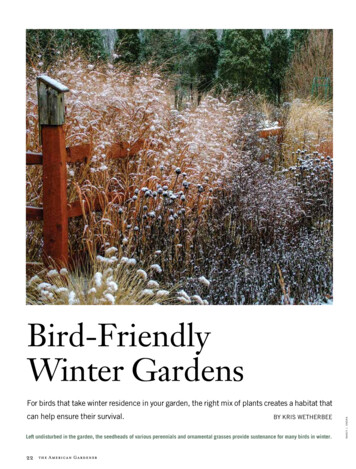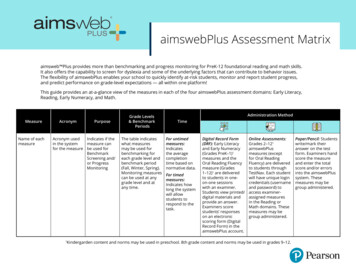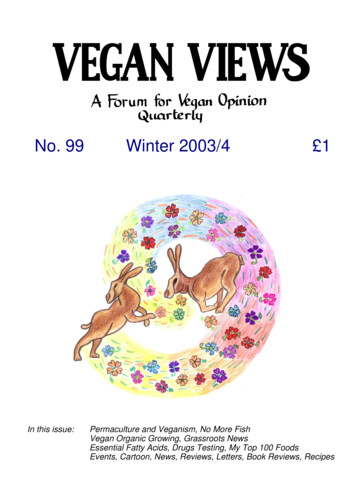
Transcription
No. 99In this issue:Winter 2003/4 1Permaculture and Veganism, No More FishVegan Organic Growing, Grassroots NewsEssential Fatty Acids, Drugs Testing, My Top 100 FoodsEvents, Cartoon, News, Reviews, Letters, Book Reviews, Recipes
VEGAN VIEWSFlat A1520 Dean Park RoadBournemouthBH1 1JBUKWeb: www.veganviews.org.ukSUBSCRIPTIONSWhen subscribing please state whichissue you wish to start from. Chequesetc payable to Vegan Views.UK four issues for 4, or single copyfor 1. Postage is included.Europe and surface mail overseasfour issues for 5 including postage.Airmail outside Europe four issuesfor 7 including e(www.veganviews.org.uk)featureshighlights from the latest issue andfrom recent back issues – going backat present to about 1992. From VV93onwards, the entire magazine can bedownloaded.Email: info@veganviews.org.uk butonly for website comments/queries.To reach the magazine directly pleaseuse the postal address.COPIES IN BULKIf you order a minimum of fivecopies, we will sell to you at 65p each(sale or return), for sale at bazaars orlocal shops.BACK ISSUESMany back issues are still availablefor 50p each. Eight for 3 includingpostage. Topics covered include:VV97 Interview with Steve WalshVV96 Interview with Karin RidgersVV95 Interview with Liz CookVV94 Vegan Organic NetworkVV93 Nutritional SupplementsVV92 Veggie PrideVV91 How and why veganVV89 Feeding the worldVV88 Farming crisisVV87 Meat in crisisVV85 Sprouting seedsVV84 Leah Leneman: in memoryVV37 Arthur Ling interviewVV34 Leah Leneman interviewPage 2VEGAN VIEWS is independent ofthe Vegan Society but shares its aims.It was started in 1975 by a group ofvegans who wanted to make contactwith others interested in creating amore harmonious way of living basedon veganism, and to communicatemore informally than could be done inthe official journal of the VeganSociety. It realises that many vegansfeel isolated from society andappreciate contact with, and news andopinions of, other vegans.We welcome all letters, articles,news, events, and constructivecriticism – and try to print all that isrelevant and of interest in themagazine. We welcome drawings too(colour preferred).We rely on readers' contributions.Small ads are free to subscribers, orcost 2 for insertion in four issues fornon-subscribers. If you don't wantyour letter published please make thisclear when writing.We expect to publish quarterly, buthave no fixed publication date, sowrite early to be included in the nextissue.SUBSCRIPTION RENEWALSIf your subscription is due forrenewal, a reminder will be includedin this issue.COPYRIGHTIf quoting from this magazine, pleaseacknowledge the source and do notdistort the sense.The sign shows that the authorreserves copyright on that article.! ! ! CONTENTS ! ! !3 Events4 Permaculture and veganism6 No More Fish7 Essential Fatty Acids8 Vegan Organic Growing9 Grassroots News10 Vegan Camp Report11 Cartoon – The Activists12 Letters13 Heart of the Matter14 Drugs Testing15 My Top 100 Foods / Poem16 Recipes17 BooksProduced by Harry Mather, withassistance from John Curtis. Frontcover by Ruth Lewis. Printed byFootprint Workers Co-op, Leeds. 0113262 4408. www.footprinters.co.uk.From the editor .The study of Nutrition in the past fewyears has brought us more and moreinformationaboutthehumanphysiology and the workings of thedigestive system. These researcheswhich consist mainly of studies ofhuman groups bring confirmation thatthe vegan way of nutrition is the onesuited for the human organism.In contrast to this improvement inknowledge, there is a growingacknowledgement of the unsuitabilityof the normal diet of a significantnumber of the peoples of the affluentnations, and obesity is of growingconcern, especially among youngchildren.Sugary and fatty foods can give afeeling of fullness and satisfaction thatleads us to neglect the equallyimportant fruit and vegetables alsonecessary for a balanced diet. Officialsources have long pleaded that weshould include a minimum of fiveportions of fruit and veg each day"Five A Day", but the message israrely heard above the constantpromotion of convenience foods andsnacks.Instead of turning to a balanced diet,the fashion is to look for systems offat reduction through diets. Althoughsome succeed in reducing theiroverweight, they then return to theirformer diet and, unsurprisingly, theyput the weight on again.The latest fad is the Atkins diet whichemphasises eating protein foods andavoidingcarbohydrates(starchyfoods). This has become fashionablethrough promotion by celebrities, butit is not a new idea. The emphasis onrich foods results in an unbalanceddiet, which, if continued, will put astrain on the digestive system. Mostpeople may have too high an intake ofcarbohydrates, as sugars are added toconvenience foods to suit theconvenience of the manufacturer.I wonder why people should look onvegans as faddists when theythemselves so readily follow the fadsof fashion and ignore the wisdom ofthe Nutritionists?VV99
EVENTSMarch Veggie Month Yearly campaign organised byAnimal Aid. Web: www.animalaid.org.uk. Tel: 01732364546.30 Apr – 2 MayPermaculture course Includessustainable design principles, permaculture ethics, organicgardening, community economics, LETS systems, forestgardening, wild food walk, optional yoga sessions, 'handson' practical experience & more Cost: 75(flexibility/concessions available). You can camp at thevenue, or indoor accommodation is available for 5 perperson per night. Held at Dial House Centre for DynamicCultural Change, North Weald (near Epping), Essex.Course leaders are both vegan: Graham Burnett (Dip PermDes) and Ron Bates. For details or to book, phone 01702303259, email landandliberty@ukonline.co.uk or sendSAE to Land & Liberty, 35 Rayleigh Avenue, WestcliffOn Sea, Essex, SS0 7DS. Web: www.landandliberty.co.uk.8 May North-West Vegan Festival Sachas Hotel, TibStreet, Manchester. 10.30 a.m. – 5 p.m. Admission FREE.Food, drink, clothing, chocolate, etc. Organised byRealfood. Email: info@veganfestivals.org.uk. Web:www.veganfestivals.org.uk. Tel: 0845 458 0146. Pleasephone or email if you can volunteer to help out on the day.9 – 22 May Permaculture course at Stepping StonesHousing Co-op in Gloucestershire. Tutors: Steve Charter& Emma Jackson, both raw food vegans. 200 for twoweek course. Details: www.permaculture-steve.net.15 May Veggie Pride March in Paris to denouncevegephobia and to act on behalf of our fellow-creatureswhose rights have been taken away. Details: David 33478 699071 or Nathalie 33 618 179109. These are Frenchphone numbers, and both contacts can speak English.Web: www.veggiepride.org (click on the UK flag).24 – 30 May 2004 National Vegetarian Week Organisedby the UK Vegetarian Society. The theme is c.org.5 – 12 Jun Vegan Summer Gathering See right.6 – 19 Jun Permaculture course at Plaw Hatch Organicand Biodynamic Farm near Forest Row, West Sussex.Tutor: Steve Charter, a raw food vegan. 200 for two-weekcourse. Details: www.permaculture-steve.net.4 Jul National Vegan Festival Kensington Town Hall,Hornton Street, London W8. (underground: High StreetKensington). 10am - 7pm, 1.50 entry (under 16 free).Stalls selling vegan products, campaigning groups,speakers, vegan food & drink, bar, music, children'sworkshops and more. They are now holding it at a new andlarger venue (where Animal Aid's Christmas WithoutCruelty is normally held in November). ampaign Against Leather & Fur (CALF).See www.veggies.org.uk/calendar.htm for the latest vegan animal events. Vegan related events are also atwww.veganviews.org.uk.VV99Vegetarian Society Cookery ClassesRun by the Cordon Vert Cookery School of TheVegetarian Society at Parkdale, Dunham Road,Altrincham, Cheshire WA14 4QG.February 2004. 16-20th Foundation 1; 21st ItalianWorkshop; 23-27th Cordon Vert Certificate.March 2004. 1-5th Foundation 3; 6th Around the World inEight Dishes; 7th Tapas Workshop; 15-19th Foundation 1.22-26th Foundation 4; 27th Gourmet & Dinner party ideas(2); 28th Light & Easy Workshop.For more details cost, contact Maureen. Email:cordonvert@vegsoc.org. Tel: 0161 925 2014. Web:www.vegsoc.org/cordonvert.11th VEGAN SUMMER GATHERING 5th-12th June2004 at Mumbles on Swansea Bay, at the gateway to thebeautiful Gower e/twin/double rooms). Approximate cost per adult 85 for the week (excluding food), or 95 if booked after24th April. One third or more off if unwaged or lowincome.Discussions, talks, trips out (to coast and countryside),communal evening meals.and very good company! About80 people of all ages usually take part. Day visitorswelcome.SAE for details to Malcolm Horne at Brynderwen,Crymlyn Road, Llansamlet, Swansea SA7 9XT (01792792442). Or see www.veganviews.org.uk/vsg.Sponsors/donations for Vegan Festivalleaflet in JulyThe next Vegan Festival is on 4 Jul at Kensington TownHall, Hornton Street, London W8 (see Events, this page).CALF, the organisers, have enough money to pay for thelarger and inevitably more expensive venue. They are,however appealing for sponsors to produce a leafletspecifically designed to attract the general public (ratherthan specifically attracting vegans), which is going to costthem around 400. If your company/organisation wouldlike to sponsor this leaflet (rather than the event itselfwhich already has plenty of sponsors), please contactRobin or Alison. If you don't want to be a sponsor, you canstill send donations to help pay for a different leaflet whichgoes out to vegans and like minded people. Tel: 0208 6709585. Email: calf@alrob.freeserve.co.uk. CALF, BM8889, London WC1N 3XX. Please make cheques payableto CALF.This symbol is the trade mark of TheVegan Society, which it permits to be usedon products which fulfil their no animalingredients, no animal testing criteria. Itmust not be used without permission.Page 3
PERMACULTURE ANDVEGANISMGraham Burnett is vegan and apermaculturist. He writesbooklets and holds courses onpermaculture. He runs Land &Liberty, through which he sellspermaculture booklets, T-shirtsand posters.Interview by John Curtis.What is permaculture?Permaculture is a way of life. It shows us how to make themost of our resources by minimising waste andmaximising potential. But living ecologically andsustainably doesn't mean giving everything up, it meansrelearning the value of nature, to understand new ways ofbeing wealthy. Permaculture methods can be applied now,whether you are gardening, doing the shopping, lookingafter kids, going to work or building your own home.Permaculture is not about getting away from it all – it'sabout taking control of our lives, our individual needs andour common future.Permaculture is a relatively new idea, the word beingcoined about 30 years ago. People in the UK began tograsp onto it around 1982.period from conventional to organic. We need a half-wayhouse. Permaculture groups are discussing permaculturestandards – earth friendly food production but whichdoesn't necessarily conform to Soil Association standards.Is the distinction that permaculture is a hobby, whereasorganic farming is a profession?No. Many people are making a living from permaculturepractices. A lot of people are applying permaculture totheir own land, and there are many small businesses thatfollow permaculture principles and ethics.What are 'Zones' in permaculture design?Permaculture introduces the concept of 'zones', the closestto the home being where human activity and need forattention is most concentrated, and the furthest where thereis no need for intervention at all. Zone 0 is in the home,where you could implement energy-efficient cooking andstorage of food, and design an ergonomic kitchen layout.Zone 1 is the part of your back garden near the back door,where you put your compost bin and also grow frequentlyused crops such as salad leaves. Zone 2 is further into yourback garden which needs slightly less attention, where youmight grow fruit bushes and trees. Zone 3 is further awaystill, perhaps an allotment where you could grow rootcrops that need even less attention. Zone 4 is semi-wild,for example coppice managed woodland used for forageand gathering other wild foods and timber, whilst zone 5 isthe wilderness, where there is no human intervention apartfrom the observation of natural eco-systems and cycles.People care features strongly in the UK permaculturemovement. Perhaps this is because in Australia wherepermaculture originated, there's lots of land but not manypeople. Here it's the opposite – we tend to live on top ofeach other, so community care features more strongly.Can a person be a permaculturist without beinginvolved in growing?Permaculture borrows from the environmentalist three R'sphrase: Reduce, Reuse, Recycle. Permaculture also adds afourth: Re-think – designing systems that use less energyin the first place.You've explained the theory. Could you give somepractical examples?How does permaculture differ from organic farming?Permaculture is a complete design system. It includesmany elements, for example architecture, agro-forestry,green economics, land design, design of cities, andintelligent design of the countryside. It integrates them,bringing them all together holistically rather thanseparating them.Organic farming tends to look at farming in isolation.Organic farming is a good thing – a progression fromindustrialised farming, but is only one part of creatingsystems for good food and good living. Many other aspectsof how we live are not very earth friendly, eg, transport,buildings, health care. A lot of organic farming systemsaren't that different from conventional systems – they arestill dominating rather than working with nature, which iswhat permaculture is all about.Organic farming is a growth sector but is very economicsled, so is quite limited. Soil Association standards are veryblack and white, you're either organic or not, there's nomiddle ground. Yet there's a two or three year conversionPage 4Yes. The permaculture design principles and ethics ofearth care, people care and fair shares apply to any aspectof being human.In run-down urban towns or inner cities or even in thecountry, starting LETS systems (Local Exchange TradingSystems, which enables people to share skills and goodson a local level using a local currency rather than sterling),organic allotments & community gardens are goodexamples of self-help.Permaculture is also about turning problems into solutions.A while ago I had ugly piles of rubble and top-soil atopposite ends of the garden. So I brought them together tomake a beautiful herb spiral. Other practical small stepsmight be to sprout beans in your kitchen or recycle waste.When and why did you go vegan?I went vegetarian in 1977 because I didn't like the taste ortexture of meat. I later became more aware of animalcruelty and the practices used in dairy farming, and wentvegan in 1984. I also became involved in animal rights,including hunt sabbing, around this time.How does veganism fit in with permaculture?Permaculture abhors factory farming, the way milk andeggs are produced on a massive level, but manypermaculturists do keep goats and livestock. This is one ofVV99
the healthy debates in permaculture, and vegans are not alone voice. Catering at permaculture events tends to bevegan oriented. Lots of veggie/vegan permaculture eventsare advertised in Permaculture magazine, and in veganmagazines too. There's a lot of tolerance in permaculturetowards vegans from non-vegans and vice versa. Bothcamps respect one another. There's quite a diversity ofviews.Veganism seems to be more widespread in the UKpermaculture movement than it is in other countries. Itdoes seem to be one of the directions we've taken overhere.In what ways do you try to encourage veganism inpermaculture?I give the vegan perspective in my books and articles buttry to remain non-judgemental. People can make up theirown minds. When running courses I do try to be nonbiased. My forthcoming book is a vegan permaculturerecipe book. I also wrote an article in Permaculturemagazine a while ago, about how I try to put permacultureconcepts into my everyday life, one of which for me isbeing vegan, since it reduces my ecological footprint. Thiswas a little controversial to some readers, but I alsoreceived a lot of support for what I was saying.Does permaculture emphasise self-sufficiency?More self-reliance than self-sufficiency. Self sufficiency tome conjures up an image of rugged individualism,someone slightly right-wing and survivalist. You wouldhave to do all of your own building and grow all of yourfood, etc. But what if you're ill? Self-reliance is where yourely on yourself but you have a network of people to helpyou out – the group itself aims to be self-sufficient. In theUK, permaculturists tend to be more interested innetworking than just looking after themselves. To me,that's about the people-care side of permaculture.Tell me about Land and Liberty, the organisation thatyou run.I've been doing punk fanzines since the late 70s. I startedLand and Liberty (www.landandliberty.co.uk) in the early90s with the first booklet that I wrote: "Well Fed not anAnimal Dead". I used Land and Liberty as a distributionfor the booklet. Things died a death after a while, but thenI wrote the "Permaculture for Beginners" guide, whichresurrected Land and Liberty. The name comes from abook by Ricardo Magon that I read on the Mexicanrevolution which was called "Tierra y Libertad", whichtranslates to Land and Liberty. I'm in the process ofchanging the name to Spiral Seed since there's anotherorganisation called Land and Liberty and this causesconfusion. The spiral figures a lot in permaculture – thespiral pattern occurs in galaxies, shells, and in the leafformation of some plants. Seed emphasises the potential offuture.We also have T-shirts. They are made by SunriseScreenprint www.menmuir.org.uk/sunrise, Tel: 01356660430. This co-operative is vegan, environmental, anduse non-bleached organic, fair trade materials. Their pricesare reasonable, they are reliable, and they can do designsVV99or you can supply your own designs. I stronglyrecommend them to groups that need T-shirts printed.I also strongly recommend Footprint Workers Co-op inLeeds. www.footprinters.co.uk, Tel: 0113 262 4408. Theydo my printing. They are very reasonably priced, veryethically based, all paper is re-cycled, and they use ecofriendly inks.When did you start your permaculture courses?The courses are run by Ron Bates and me. The first onewas a 2-day course in 1998, through the local LETSscheme, which fitted well with the essence ofpermaculture. We later ran a Vegan Organic course inSouthend.I gained a diploma in permaculture in September 2001,and last year we ran two permaculture courses at DialHouse in Essex – one in May and one in August. The onein August was less well attended, and people have sinceadvised us not to run a course in August since many peopleare on holiday.I hear that you have a few allotments.I've got a back garden and three allotments. Two of theallotments are for vegetables. I'm the secretary of myallotment committee, which is ironic since for years I wastold off by the committee for having too many weeds!Things are changing though. The out-dated image ofallotments came from the war and post war period. There'snow a younger energy coming in. My third allotment is inLeigh, three miles away, committed to creating a forestgarden with fruit bushes, apple trees, etc.Do you dig?I dig a bit but keep it to a minimum. Digging does havesome benefit since I have heavy clay soil and bindweedinfestation. Digging is just one option of many.You've got lots of things on – three allotments, a gardenLand & Liberty, Permaculture, courses, a job andchildren. How do you fit everything in?My kids and partner are a bit interested, although not ingardening. We are an all-vegan family, living asenvironmentally as practical. I try to keep things balanced.My partner is a child minder. I'm a day centre officer foradults with learning disabilities.Any future plans?I'm writing a permaculture cookbook, with vegan recipesand articles about permaculture. All my previous bookletsI've published myself, but this will hopefully be publishedby Permanent Publications, the publishers of Permaculturemagazine. They are supportive of the vegan ideals – theytake lots of copies of my "Well Fed not an Animal Dead"booklet.Our thanks to Graham Burnett for the interview, and fortelling us about Footprint Workers Co-op who print someof Graham's materials, and who now print Vegan Viewsmagazine.Graham and Ron Bates have another of their permaculturecourses 30 Apr – 2 May – see Events p 3 for details.Page 5
NO MORE FISHMany who give up red meat feel a need to eat some fish atleast for a while, but fishes are animals not vegetables. TheVegetarian Society has made a great effort to educatecaterers in particular on this point by insisting that fish donot grow on trees nor sprout out of the ground. They stressthat fish are real animals and they have found the name'pesky vores' for those who still eat fish.The subject of fish has become important these days ontwo points. One is that nutritionists have seized on theimportance in the diet of fatty acids, mainly omega 3, for ahealthy heart and they are advising that one should eat oilyfish about twice a week. The other topical issue is that fishstocks are dwindling to the point that the EU is insisting onimposing restrictions on fishing. It is no longer possible tosay "there are plenty of fish in the sea". On the contrarysome species such as cod are facing extinction if fishing onthe present scale is continued. Fishermen are having toaccept quotas being imposed and no-take zones imposed toallow cod to replenish.Fishermen view this with horror as an end to theirlivelihood, but fishing is no longer the simple occupationthat it was 100 years ago. The number of fishing boats hasdeclined but their size and technical efficiency hasincreased. Incredibly, trawler nets can be severalkilometres long and be fitted with weighted boards thatscrape the bottom of the sea and churn up the sediment.They destroy the whole environment of the sea bottom anddestroy the habitat where some fish breed. It is alsodestroying the newly-discovered cold water corals in theNorth Sea and the Atlantic, which are just as spectacular asthe corals found in warmer waters. On a typical 15 daytrip, a trawler may sweep about 33 square kilometres ofdeep sea habitat. Corals reefs take centuries to develop andit is hoped to protect at least some of these newlydiscovered wonders.The old way of fishing was to locate a quantity of the fishyou wanted and throw nets overboard to catch them.Modern methods trawl up all the fish in a huge areaincluding many unwanted types, some deep sea odditiesand more popular ones such as dolphins that are beingkilled by this process. Endangered species have to bethrown back, so are other unwanted fish, but exposingthem to the air has already killed them. They attack the seain the same way that cattle farmers are attacking therainforests. The seas are being plundered and ecosystemssuffer. And the struggle magnifies as the fish stocksdiminish. Incredible as it may seem, a style of fishing hasbeen developed where an area is blasted with dynamite andthe dead fish scooped up. In spite of these high techprocesses, fishermen still rely on government subsidies,just as the farmers on land do.Global warming is also affecting the numbers anddistribution of fish stocks and European boats go fartherafield, even to the coast of West Africa, where theydeprive local populations of their scant food resources.Fish are cold blooded and not pleasant to touch, so peopledo not grant them the same nature of feelings as they do toPage 6warm blooded, furry animals that we may enjoy stroking.This does not mean that they are devoid of feelings. Unlikeplants, they have a nervous system and scientific studieshave shown that they feel pain. Certainly, being caught bya hook in the sensitive area of the mouth must cause painand hauling them out of the environment where they obtainoxygen through the water passing over their gills is boundto suffocate them. This is equivalent to air-breathingcreatures being dragged under water and fish do notbenefit from being stunned before death as farm animalsusually are.A solution to the problem of dwindling fish stocks hasbeen to develop fish farming, that is breeding fish in hugecaged tanks close to the shore. You can feed them, catchthem more easily and select which type to breed accordingto market demand. Trout and salmon are preferred. This'factory farming' of fish has the same disadvantage as theintensive farming of land animals, namely that diseaseswill spread rapidly and strong pesticides have to be addedto the water to maintain the health of the fish. Some of thisdrifts down to the bottom of the sea, together with aconcentration of faeces and excess food to pollute the areabelow the fishes. The decaying waste matter uses up theoxygen in the water and stifles other fish and vegetation.Fish farming is also a flawed solution because oily fishsuch as salmon feed off smaller fish and it is necessary tocatch fish from the open sea in order to feed the farmedfish. Fish is also used to feed land animals and it iscalculated that a quarter of all fish production is fed to landanimals. Some may be also be used as fertiliser for theland. We are plundering the diminishing stocks of fish notonly as food unnecessary for humans but also to feed farmanimals, the consumption of which is also unnecessary forour health. It looks as though we are being advised to eatfish for a healthier heart whilst condoning the eating ofanimal fat which is a great cause of heart disease.If fish is to be considered as healthy food, then we shouldassume that the fish are living in a healthy environment.Far from it! All the pollution created on land fromindustry, farming practices and general waste is graduallycarried by streams and rivers into the sea. Strong poisonslike mercury, organophosphates, dioxins and PCBsaccumulate in the sea and are taken up by the marine life.It was found that up to 40% of some fish products on salecontained pollutants. Decades ago it was found that fish inone bay in Japan were polluted with mercury and causingdeaths locally. This was traced to discharges of mercuryfrom a local factory. Today fish all over the world arefound to contain mercury, a heavy poison, as well as otherpollutants, including radio activity.A recent survey published in the magazine Science foundthat Scottish salmon was the most polluted of all farmedfish and contained unacceptable quantities of dioxins andPCBs. They recommended that it should only be eaten 3 or4 times a year. (Nutritionists want us to eat oily fish 2 or 3times a week). The Food Standards Agency claim that thestated levels found in Scottish salmon were acceptable byEU regulations, but admitted they themselves had made notests since the mid 1990s.VV99
Shell fish are heavy on the digestion at the best of timesand Moses was wise when he forbade his followers to eatshell fish; but today the shell fish are even more polluted.The popularity of prawns has had other undesirable results.Farmers in India and South East Asia are encouraged bythe high price paid for of prawns to turn the land they useto grow (poorly paid) food crops over to producingprawns. But as production soars, the price falls and someare left without a livelihood and with land no longersuitable for producing crops for their own use.Shell fish may be even less attractive to us than other fish,but they too are sentient creatures with nervous systems.To plunge them alive into boiling water must certainly bean act of cruelty.So if we don't get the fatty acids like omega 3 from oilyfish, what are vegans to do? The answer is simple: vegansources of essential fatty acids (EFAs) can be found inplenty in seeds and nuts and oils (see box below).So live and let live. Leave the fish in the sea to work outtheir own destinies so that we can again say "there areplenty of fish in the sea."H. MatherEssential Fatty Acids – a guide for vegansSource: Plant Based Nutrition and Health, Stephen WalshGenerally, vegans (and vegetarians too) get too manyomega 6 EFAs and not enough omega 3 EFAs. In fact,eating too many omega 6 fatty acids hinders the absorptionof the omega 3s. There's a simple way to change this Poor choices Sunflower oil is very rich in omega 6s but isvery low in omega 3s, so a poor choice. It also has highamounts of polyunsaturated fat, which is not good since it'sbetter to have the bulk of your fat as monounsaturated fat.Soya oil is slightly better than sunflower oil, but is still notoptimal.A VEGETARIAN IN TAIWANVegetarianism is good for health, the spirit and theenvironment. Meat from animals, including that fromfowls and fishes, to put it simply, is not necessary. Andthis way of living makes an easier way for the spirituallife.In the textbook in primary schools of Taiwan, there arecalculations regarding the environment: from the sameamount of land, one can harvest more vegetables thanmeat.The diseases of pigs (e.g. Taiwan), hens (Hong Kong),cattle (Britain, Japan), fish (Taiwan), etc., clearly show,that animals are not fit to eat. Further, the breeding of pigsfor food in Taiwan pollutes the rivers; and the enterprisesdo not profit from this breeding, but lose money. So,vegetarianism is better. It conforms with laws respectingNature and those who look to the laws of Nature andappreciate the environment, should be vegetarian.In the Chinese language, the word for vegetarianism is"sushi" and its meaning is "simple eating". In Taiwanabout 5% of the inhabitants never eat meat.The largest following for vegetarianism is in Buddhism.They eat vegetarian but do not use any spice
5 – 12 Jun Vegan Summer Gathering See right. 6 – 19 Jun Permaculture course at Plaw Hatch Organic and Biodynamic Farm near Forest Row, West Sussex. Tutor: Steve Charter, a raw food vegan. 200 for two-week course. Details: www.permaculture-steve.net. 4 Jul National Vegan





